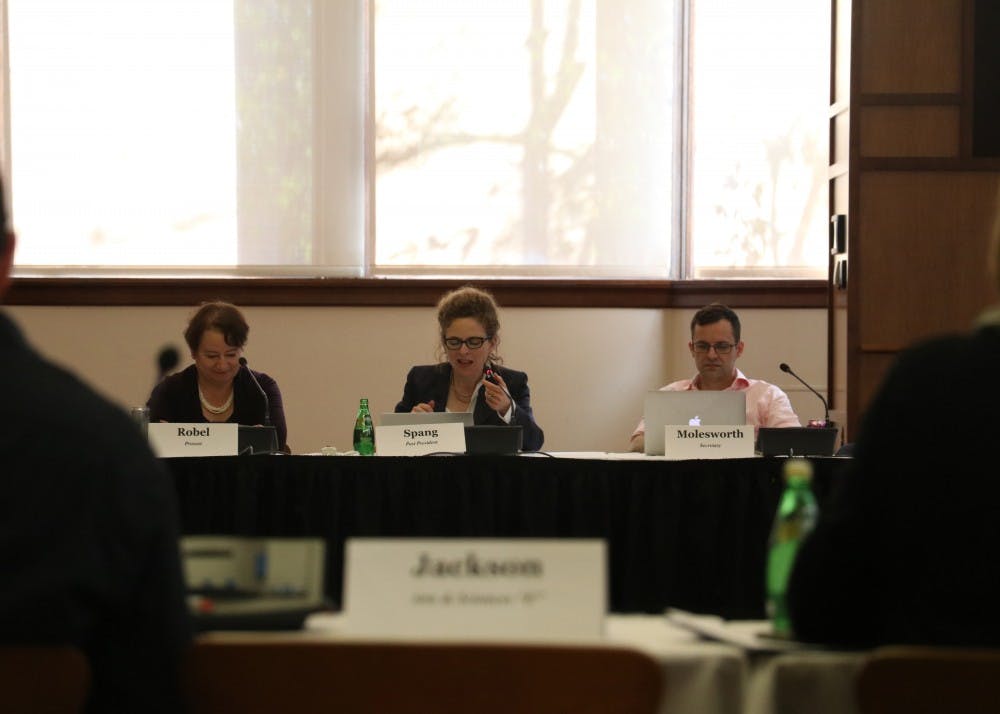The Bloomington Faculty Meeting on Oct. 17 focused on the Grand Challenges in IU’s research, the summary funding from the Budgetary Affairs Committee and revisions that are being looking into for the Bloomington Faculty Council constitution.
Campus research initiatives
The Grand Challenges of addiction crisis, precision health and environmental change as well as other emerging areas of research were presented to the council.
Vice Provost of Research Rick Van Kooten said the goal of the campus research initiatives was to maintain IU as a research facility, but not necessarily make them study these specific topics.
“We’re not just doing this to get people to do research,” Van Kooten said.
Van Kooten said the Office of the Vice Provost for Research is taking a fractal approach in internally supporting research from all scales at the University.
The newest Grand Challenge is focused on addressing the addiction as substance-use disorders. It is different in that it takes collaboration with the state and community, Van Kooten said.
He said the second challenge, the Precision Health Initiative, is a collaboration between IU and IU Health to look into personalized prevention and treatment using a patient’s genes. The goal is to cure at least one cancer and one childhood disease and to find a preventative solution to one chronic illness and one neurodegenerative disease.
The last Grand Challenge team is looking into environmental change and the tools needed to prosper despite a shifting climate. Van Kooten said Indiana is facing the risk of not being able to grow corn due to environmental change affecting the soil and having an increase of ticks and lyme disease due to milder winters.
Van Kooten said the office is currently looking into other emerging areas of research, one area being learning in children. They have received 20 full proposals as of Oct. 13 and are looking to choose up to two this fall.
Budgetary Affairs Committee
Provost Lauren Robel gave a report about the Budgetary Affairs Committee’s process and funding amounts.
The total funding dispersed around the University from the committee was $5,810,862, and $4,909,300 of this was given out of the Provost Funds.
A large portion of funding went toward academics. The graphs showing this data will be available under the category “auxiliary documents” on the Bloomington Faculty Council website.
“I just feel very strongly that it’s really important that we prioritize academics,” Robel said.
Robel said the budget process consisted of a meeting in February that involved administration, academic units from the individual schools, support units and the committee members of the Budgetary Affairs Committee.
She said she identifies the priorities that she sees for the campus in the coming fiscal year such as research initiatives and diversity in students, faculty and staff. Then, the other units give presentations of their priorities. From there, decisions are made based on available resources.
The schools and committees were asked to think ahead so they can solve problems in the budget before they become serious problems, so the presentations of the units help that.
Parliamentarian Elizabeth Housworth said this allows deans to see what deans from other schools are doing.
“Part of the new process is a great deal of openness,” Housworth said.
Updating the Bloomington Faculty Council Constitution
Housworth said the Constitution and Rules Committee is considering a controversial change on the issue of formally adding professors of practice on the nontenured track.
Although they have not been given access before, these professors have a right to a faculty board of review in issues regarding academic freedom, so they need to be added to the Council, Housworth said.
One course of action they are considering is adding a fourth category to the nontenured track faculty in the constitution, allowing professors of practice one member on the council.
The other track that is being considered is grouping the 31 professors of practice in with the lecturers in the constitution, which would make the one representative on the council disproportionate.
Housworth said revisions of the constitution consist of changing the wording about the way the executive committee is elected, avoiding listing the school names to allow for fewer changes when the school names change and having a roll call vote only on controversial issues.
Housworth said a first reading of the constitution with the changes is anticipated to be next month if things go smoothly.




